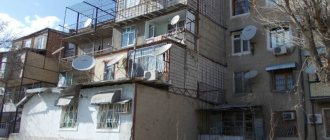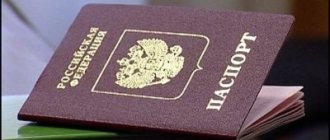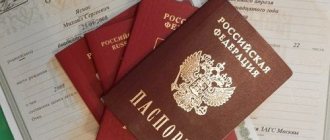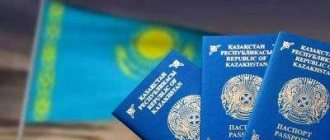Registration rules
The procedure for registering in a room in a communal apartment is no different from registering in any other residential premises.
| No. | Procedure |
| 1 | Obtaining consent of the owner (municipal or private owner) |
| 2 | Preparation of documents |
| 3 | Receiving a passport |
The service is of a declarative nature. If there are several owners of the room, then each of them must submit a personal application - consent to registration.
Obtaining owner consent
If registration is necessary for the owner of the room on the right of ownership, who recently purchased this living space, then he does not need to obtain permission at all. It is enough to go to the passport office at the location of the apartment and submit documents.
Moreover, it does not matter whether the citizen is the sole owner or owns only a share in the room.
The employer registers on the basis of a social tenancy agreement. The document gives the right not only to the responsible tenant, but also to his family members (specified in the contract) to receive registration in the room.
Preparation of documents
List of documents that must be submitted to the authorized body:
- civil passport of the owner - a private person;
- permission from the owner - local administration;
- employer's civil passport;
- civil passport of the citizen who needs to be registered;
- birth certificate of a child aged 0 to 13 years (if registration is required);
- extract from the Unified State Register for a room in the apartment;
- application from the owner - a private person;
- application from a citizen who needs to be registered.
The application must be completed by a person over 14 years of age. In relation to minor citizens, documents are drawn up by their legal representatives.
Receiving a passport
Depending on the method of filing the application, the processing time for the application varies.
The following options are possible:
- passport office – 7 days;
- through the MFC – 8 days (the period is increased due to the need to transport documents);
- through the State Services electronic portal - on the appointed day, 7 days after submitting the electronic application.
Only a person who needs registration can come for documents. The presence of the owner or tenant is no longer required.
Important! The service is provided exclusively free of charge. Any collection of fees is illegal.
Registration in a communal apartment in 2020
In the room
If a citizen is the owner of a room, he has the right to register anyone in the premises, be it relatives or strangers.
Registration gives rise to two types of rights:
| Ownership | that is, the use and disposal of the room (this number also includes registration in the living space of other residents) |
| The right to common areas in communal housing | belongs to all room owners in equal shares |
The registration itself will be carried out in a separate room belonging to the citizen or provided under a social tenancy agreement.
Owner
If the housing is municipal property, then you will need to obtain permission for registration from the executive authority that acts as the owner of the housing.
What you need to register in a new apartment, read the article: how to register in a new apartment (register). How to register in a new building with ownership rights, read here.
It will also be necessary to collect consent from all persons living in the communal room.
An exception will be the registration of family members of the employer or his close relatives.
Minor citizen
Registration of children is carried out in a simplified manner. There will be no need to obtain prior consent from either the owners or occupants of the premises.
If the child has not reached the age of 14, then registration will be carried out on the basis of an application submitted by the parents and their passports.
Foreign applicant
For them, the rules and nuances of registration in communal housing are the same as for Russians.
Citizens arriving from countries that have a visa regime with the Russian Federation can register only for the period of its validity.
Registration in a communal apartment without the consent of neighbors
The owner can register any citizen in his room in a communal apartment without the consent of the neighbors.
Since 2020, the possibility of limiting the number of registered citizens depending on the area of the apartment is being considered.
In this case, owners of communal apartments will lose the opportunity to obtain registration for a wide range of people.
Only close relatives will be able to obtain registration.
The law provides for a special approach to registration in a communal apartment for various categories of citizens:
- for minor children;
- for the owner and his family members;
- for the employer and his family members.
Minor child
The owner, tenant, and third parties who are registered in a communal apartment have the right to register their official child without notifying the owner of the property, other residents and owners of other rooms.
Subsequently, he can be discharged only by a court decision or at the request of a parent.
Only the official parent is given the opportunity for unhindered registration. That is, a man or woman must be included in the child’s documents as a parent.
In case of deprivation of parental rights, a citizen does not lose this opportunity.
The owner and his family members
The owner of the apartment has the right of ownership to obtain registration in the room. The law considers a room in a communal apartment to be individual living space.
Therefore, there is no need to obtain the consent of neighbors in a communal apartment. The exception is the situation. When relatives own several rooms in an apartment on the basis of shared ownership.
Then you need to obtain permission for registration from the co-owners. But the owners of other rooms cannot influence the owners' decision.
Important! Family members of the owner who are registered in the room have the right to register their minor child (aged 0 to 18 years) in it without the consent of the owner. He doesn't even have to notify him about it.
Example . Ilya and Sofia inherited from their grandmother 2 rooms in a communal apartment on the right of common shared ownership. Ilya got married and moved into one of the rooms. But Sofia refused to consent to registration in the apartment of her brother’s wife. Although the girl did not actually live in the premises, the passport office refused to register Ilya’s wife. Thus, Ilya’s wife actually lived in the apartment, but could not obtain registration.
Registration in a communal apartment
The documents required for registration at a citizen’s place of residence are listed in Art. 6 of the Law of the Russian Federation of June 25, 1993 N 5242-1 “On the right of citizens of the Russian Federation to freedom of movement, choice of place of stay and residence within the Russian Federation” and clause 16 of the Rules for registration and deregistration of citizens of the Russian Federation at the place of stay and at place of residence, approved Decree of the Government of the Russian Federation of July 17, 1995 N 713 (Rules). According to the above documents, to register at the place of residence, a citizen must submit: - an identification document; — application for registration at the place of residence; - a document that serves as the basis for moving into residential premises (including an application from the person(s) who provided the residential premises). In a communal apartment, the residents have exclusively common property in common ownership. A citizen who owns a room in a communal apartment is its sole owner. The other owners of rooms in the same apartment are not directly related to it and are not its co-owners. The list of restrictions on the ownership rights of the owner of a room in a communal apartment is established in Part 5 of Art. 42 Housing Code of the Russian Federation. The legislation does not provide for such restrictions as the lack of consent of neighbors for the owner to move family members into his premises. Therefore, as the owner of such a room, a citizen in accordance with Art. 209 of the Civil Code of the Russian Federation has the right to use, own and dispose of the room belonging to him at his own discretion. He also has the right to register his family members in it. Moscow Government Decree No. 859-PP dated October 31, 2006 obligated registration authorities to require the consent of neighbors in a communal apartment for the owner to move family members into his premises. However, the Supreme Court of the Russian Federation declared the corresponding norm of the Resolution illegal and canceled it (Decision of the Supreme Court of the Russian Federation dated October 10, 2007 N 5-G07-76). As the Court indicated in its Determination, part 5 of Art. 42 of the Housing Code of the Russian Federation for owners of rooms in a communal apartment, an exhaustive list of restrictions on property rights is established. Such a restriction of property rights as the consent of the owners of all living rooms in a communal apartment for the owner to move members of his family into his room is not provided for by law.
What does registration in a communal apartment cover?
A communal apartment is represented by an apartment in which each room belongs to one or more people. Additionally, there are rooms that are common, so everyone can use them.
If a person is the owner of a room, then he can easily register any other citizen in it, even if other residents are against this decision.
Owner
A person can be registered in a municipal apartment only after obtaining consent to the process from the municipal authorities and other residents.
If the property belongs to a person by right of ownership, then he can register any other citizen in the room, and it does not matter whether the people have any family ties.
Registration in this case consists of the following steps:
- documentation for registration is prepared;
- title documentation will certainly be submitted to the FMS, confirming that the person really is the owner of the room;
- the submitted documentation is checked by employees of the institution;
- A registration mark is placed in the applicant’s passport.
Registration in a communal apartment, provided that the room belongs to a person by right of ownership, is considered a simple and quick process.
Room
If the room was previously privatized, then the person is considered its owner, so he can register both relatives and strangers on the territory.
It is taken into account that in a communal apartment there are not only rooms where people live, but also common areas that each tenant can use.
Registration in 2020 will be carried out in the room where the person who wants to register another citizen in real estate lives. The entire process will follow the usual sequence of actions. You only need to prepare a complete package of documents, which is brought to the MFC or the Federal Migration Service office. You have seven days to register.
Municipally
Any real estate owned by a municipal fund is provided to citizens on the basis of social rent. All residents act as tenants, so their rights in relation to the property are limited.
The process of registration in a communal apartment, which is municipal property, is regulated by Art. 70 LCD. Registration of close relatives can be carried out without the permission of municipal authorities, but other residents must agree to this process. If it is necessary to register an outsider, then permission must be obtained from both residents and municipal authorities.
The municipal authority may prohibit the occupancy and registration of new citizens if the area of the apartment does not allow this, as certain standards must be taken into account. If minor children are included, this process does not require consent from other residents or the municipality.
To register you will have to prepare the following documentation:
- consent from municipal authorities;
- written permission to register another person, received from each resident of a communal apartment who has reached the age of majority;
- passport of the tenant of the communal apartment and the citizen who needs to be registered in the real estate;
- a personal housing account or a housing warrant is provided to the FMS office;
- the statement is formed correctly.
These documents are checked within a week, after which the new resident is issued a passport with a registration mark.
Sample application for registration at the place of stay
Temporarily
Temporary registration in a communal apartment does not require that the citizen be discharged from his main place of registration. This leads to the fact that a person has two types of registration.
Registration is not required if a person plans to stay in a particular region for less than 90 days. If after this period of time there is no temporary registration, then the tenants in whose apartment the person lives may be held liable in the form of large fines.
Such registration is issued for a period from 1 day to 5 years.
To carry out the process you will need:
- passport or birth certificate if you need to register a minor child who has not yet turned 14 years old;
- an application drawn up and executed correctly;
- title documents;
- consent of other residents and authorities.
The application form is issued directly at the FMS office or at the MFC.
Relatives
If the owner of a room in a communal apartment wants to register his relative in the apartment, then he does not need to obtain various permits. Even if relatives are registered, standards regarding the size of living space per person are taken into account, so there is often no opportunity for registration.
If a person is not a co-owner of the room, then even to register a relative, permission from other residents will be required. An exception will be the registration of minor children.
Foreigner
If a foreigner registers in a communal apartment, then the same rules apply as for Russian citizens. Therefore, the owner of the property can register a person without the permission of the authorities or other persons, and the tenant is obliged to obtain written consent from other tenants and the municipal authority.
Foreign citizens can register temporarily or permanently. Temporary registration is required if a person plans to stay in the country for more than 7 days, and permanent registration is issued if a foreigner wishes to live permanently in the country.
If a person comes from a country with which Russia has a visa regime, then he can stay on the territory of the Russian Federation only for the period of time during which the visa is valid.
Procedure for registration in a communal apartment
Now let’s look at a practical example of how to register a person in a communal apartment. There are two options: “you are the owner” and “you are the tenant” of the residential premises.
You are the owner
Registration can be at the place of residence (permanent) or at the place of stay (temporary). In both cases, you must appear at the migration department of the Department of Internal Affairs of the district in which the apartment is located, or at the MFC. To receive this government service you will need to provide:
- your passport and the passport of the person being registered;
- birth certificate (if you are registering a child under 14 years old);
- a document confirming your ownership of the room;
- house book if available.
In addition, you will need to write an application for permanent or temporary registration. In the first case, the result of the provision of the service will be registration at the place of residence with the corresponding stamp affixed to the passport. In the second case, a certificate of temporary registration at the place of residence is issued, which will be valid for the time specified by you in the application (from 6 months to 5 years).
You are an employer
If you use municipal residential premises on the basis of a social or commercial tenancy agreement, then to register close relatives you will need to provide the above papers, excluding the document of ownership. Instead, you need to attach a rental agreement. To register other persons, you will need to provide permission from the municipality, as well as the consent of other adults registered in the room.
To register a person in a communal apartment, you must write a corresponding application to the migration department of the Department of Internal Affairs or to the MFC, and also provide the necessary package of documents, including permission from the municipality and other registered persons, if the housing is municipal. To register in your own home, such permits are not required.
The documents required for registration at a citizen’s place of residence are listed in Art. 6 of the Law of the Russian Federation of June 25, 1993 N 5242-1 “On the right of citizens of the Russian Federation to freedom of movement, choice of place of stay and residence within the Russian Federation” and clause 16 of the Rules for registration and deregistration of citizens of the Russian Federation at the place of stay and at place of residence, approved Decree of the Government of the Russian Federation of July 17, 1995 N 713 (Rules). According to the above documents, to register at the place of residence, a citizen must submit:
Identity document;
Application for registration at the place of residence;
A document that serves as the basis for moving into residential premises (including an application from the person(s) who provided the residential premises).
Quite often, disputes arise from the requirements of the registration authorities to obtain the consent of the remaining residents of the apartment for the owner to move in to another person. However, it is worth noting that this requirement is legal only if the apartment is in common ownership (shared or joint). Then indeed, in accordance with Art. 247 of the Civil Code of the Russian Federation requires the consent of the remaining co-owners of the apartment, since in this case the use and ownership of the residential premises is carried out jointly by all residents.
The situation is different with a communal apartment, which should not be confused with premises in common ownership of citizens. In a communal apartment, the residents have exclusively common property in common ownership.
A citizen who owns a room in a communal apartment is its sole owner. The other owners of rooms in the same apartment are not directly related to it and are not its co-owners.
The list of restrictions on the ownership rights of the owner of a room in a communal apartment is established in Part 5 of Art. 42 Housing Code of the Russian Federation. The legislation does not provide for such restrictions as the lack of consent of neighbors for the owner to move family members into his premises. Therefore, as the owner of such a room, a citizen in accordance with Art. 209 of the Civil Code of the Russian Federation has the right to use, own and dispose of the room belonging to him at his own discretion. He also has the right to register his family members in it.
Moscow Government Decree No. 859-PP dated October 31, 2006 obligated registration authorities to require the consent of neighbors in a communal apartment for the owner to move family members into his premises. However, the Supreme Court of the Russian Federation declared the corresponding norm of the Resolution illegal and canceled it (Decision of the Supreme Court of the Russian Federation dated October 10, 2007 N 5-G07-76).
As the Court indicated in its Determination, part 5 of Art. 42 of the Housing Code of the Russian Federation for owners of rooms in a communal apartment, an exhaustive list of restrictions on property rights is established. Such a restriction of property rights as the consent of the owners of all living rooms in a communal apartment for the owner to move members of his family into his room is not provided for by law. If the relative of the author of the question fails to register due to the lack of consent of the other residents of the communal apartment, he should first receive a written refusal to register, and then appeal this decision to the court.
Yu. Tereshko
This article will tell you how you can get a residence permit in a municipal apartment, what you will need for this, what restrictions exist for this, what the process is, and whether there are any advantages when registering with relatives.
A list of documents required for registration is also provided.








